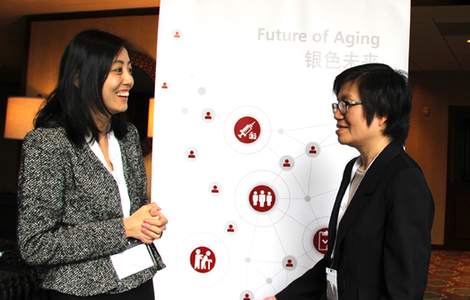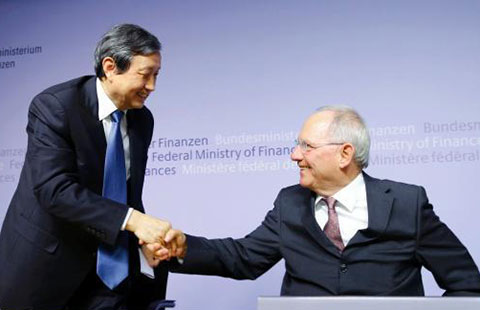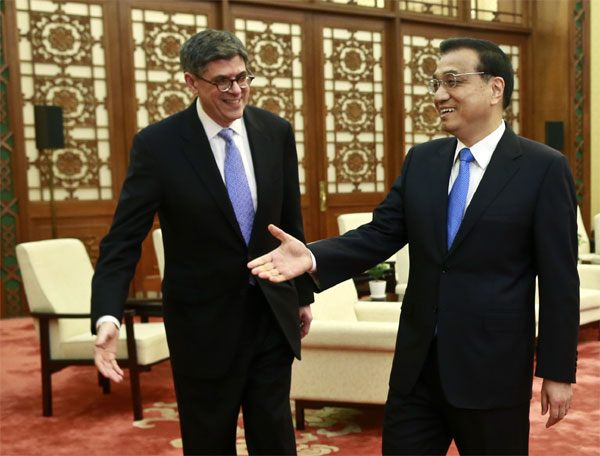US 'willing to work with AIIB': Lew
Updated: 2015-03-31 11:58
By Chen Jia and Zhao Yinan in Beijing and Chen Weihua in Washington(China Daily USA)
|
||||||||
|
Premier Li Keqiang greets US Treasury Secretary Jacob Lew at the Great Hall of the People in Beijing on Monday. [Feng Yongbin / China Daily] |
Treasury's comment appears to rule out US joining Asian bank
Washington is willing to cooperate with the new China-led infrastructure investment bank, according to US Treasury Secretary Jack Lew.
Observers said the comment rules out the possibility of the United States joining the Asian Infrastructure Investment Bank.
Lew, who is visiting China as President Barack Obama's special envoy, said on Monday that Washington is looking forward to cooperating with the new bank, Xinhua News Agency reported.
The US welcomes and supports proposals that are helpful to infrastructure construction, the report said.
Lew said cooperation can be carried out through the China-US Strategic and Economic Dialogue, the World Bank, the AIIB and any other mechanisms accepted by the two countries.
He made the comments while meeting Premier Li Keqiang on Monday, said Xinhua, quoting Vice-Minister of Finance Zhu Guangyao.
Lew said in his hourlong talk with Li that the US welcomes China playing a bigger role in infrastructure construction in Asia and is willing to deepen cooperation on bilateral and multilateral platforms in that regard.
Li urged the US to approve International Monetary Fund quota and governance reforms as soon as possible. The US Congress, to the disappointment of the Obama administration, has refused to endorse the IMF reforms approved by every other IMF member country to give more say to emerging economies like China and Brazil.
Lew's words reflect a shifting US attitude toward the AIIB. Ten days ago in testimony before the US Congress, Lew stressed a common US talking point about the possible governance and transparency standards of AIIB, such as on labor and the environment.
The US also has lobbied its key allies of South Korea, Japan and Australia not to join the bank. It expressed anger after Great Britain applied to join the bank on March 12. South Korea and Australia have both applied to join the bank in the past week.
The US stance has received sharp criticism both at home and overseas.
Ding Yifan, an economist at the State Council's Development Research Center, said Lew's statement indicates that the US is unlikely to join the new bank. But Ding said Washington has softened its stance by opening the door to cooperation with the bank.
In Beijing, Lew also met Vice-Premier Wang Yang on Monday, just one day before Tuesday's deadline for countries to apply to become founding members of the AIIB.
Egypt applied on Monday, taking the total number of nations to 44 across four continents. The number more than doubled the 21 countries that signed a bill last October to launch to bank. Many new applicants are members of the G7 and G20.
During the meeting with Wang, Lew said that promoting innovation and opening markets are of mutual interest to both countries.
Reuters reported that Lew said in a statement that he would discuss with the Chinese government recent technology moves that the US has complained constitute unfair regulatory pressure on foreign firms.
China said early this month that work was ongoing on a draft anti-terrorism law that would require foreign firms to hand over encryption keys and otherwise facilitate Beijing's ability to bypass security measures, Reuters reported.
China has a deep concern over cybersecurity following former National Security Agency contractor Edward Snowden's revelations that the US government has been collecting information by installing backdoors into US tech firms.
Both the FBI and the NSA have been pushing for a new US law that would force tech companies like Apple and Google to hand over the encryption keys or build backdoors into their products and tools so the government would always have access to people's communications, according to a Guardian report.
Contact the writers through zhaoyinan@chinadaily.com.cn

 First round-world solar flight stops in China
First round-world solar flight stops in China
 Elderly care explored for investors, needy
Elderly care explored for investors, needy
 Sasha Obama took trip to China
Sasha Obama took trip to China
 10 European countries applying to join AIIB
10 European countries applying to join AIIB
 Things are not always what they seem on April Fool's Day
Things are not always what they seem on April Fool's Day
 Welcome cherry blossom season in Tokyo
Welcome cherry blossom season in Tokyo
 Students show support for Earth Hour
Students show support for Earth Hour
 Sleep with fish at Tianjin aquarium
Sleep with fish at Tianjin aquarium
Most Viewed
Editor's Picks

|

|

|

|

|

|
Today's Top News
46 countries seek to join AIIB
US 'willing to work with AIIB': Lew
Silk Road connects China to the world: BOC chairman
Washington 'willing to work with AIIB'
China should police bad foreigners, too: expert
One dead, two hurt as vehicle tries to ram US spy agency gates
Yili Group milks world of industry experience
China's GDP growth likely to rise to 7.2% in Q2
US Weekly

|

|








